Fiocruz president is granted France’s Legion of Honor
06/09/2021
Ricardo Valverde (Fiocruz News Agency)
Last Wednesday, September 1st, Nísia Trindade Lima, president of Fiocruz, was granted the Knight Grade of France’s Legion of Honor (Ordre National de la Légion d'Honneur). She was graced with the honor as an acknowledgment of the Foundation’s president in the fields of Science and Health, especially regarding the actions undertaken by the institution in the fight against the COVID-19 pandemic. The ceremony, which took place at Praça Pasteur, at the Fiocruz Manguinhos campus, in Rio de Janeiro, was limited to a few guests, who followed strict social distancing protocols. The honor was given to Lima by the French ambassador in Brazil, Brigitte Collet. Ms. Collet said that “it was a pleasure to grant this honor at this square, a symbol of the friendship and partnership between the two countries”. Collet praised the “exceptional and admirable role played by Fiocruz in this public health crisis, a role led by its president”. The Légion d’Honneur order of merit was instituted in 1802 by Napoleon Bonaparte and is France’s highest distinction, granted by the Chief of State to personalities who have stood out for their activities in their area of actuation in the global scenario.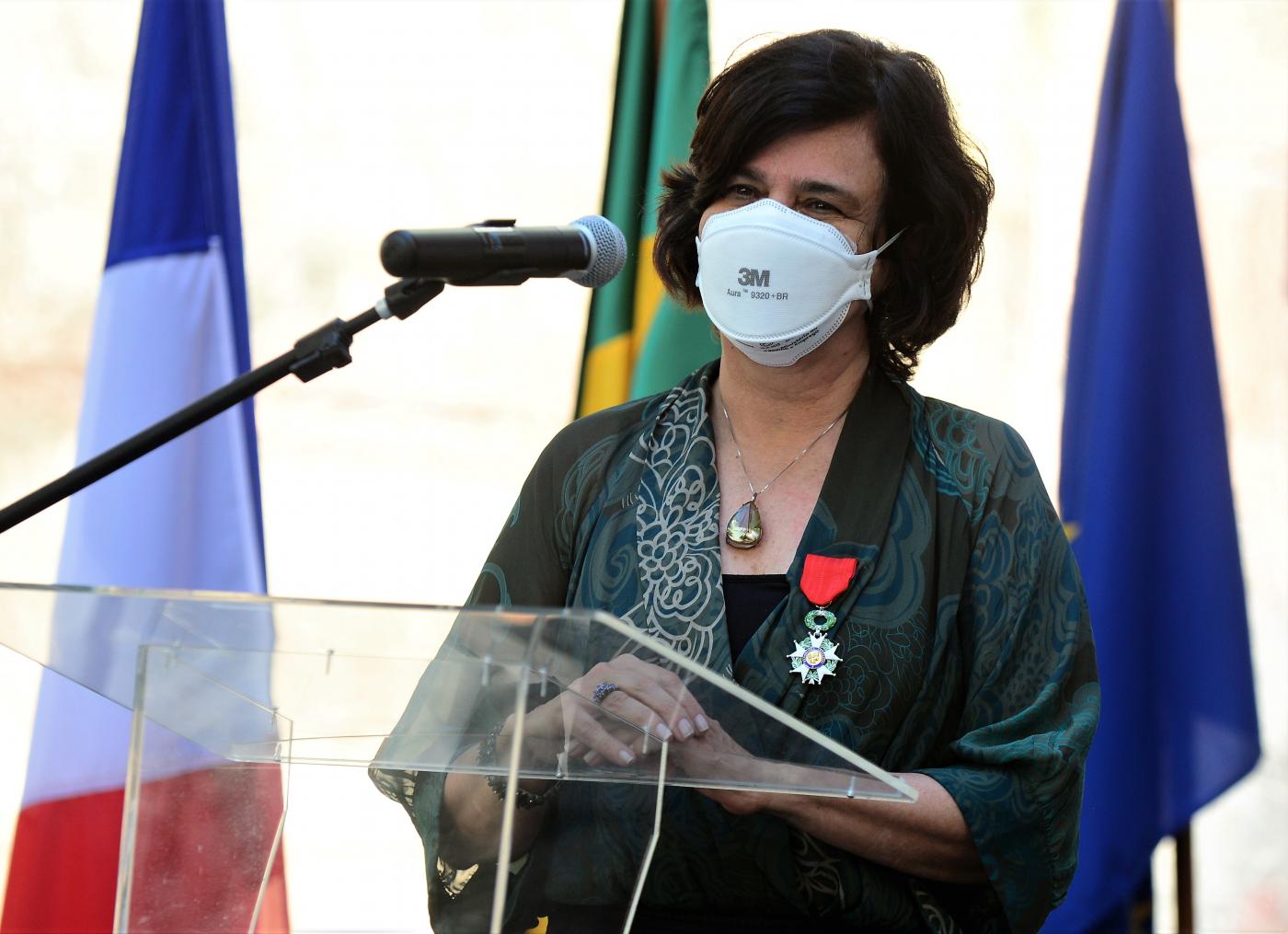
Nísia was graced with the honor as an acknowledgment of the Foundation’s president in the fields of Science and Health (Photos: Peter Ilicciev)
The outdoor event was attended remotely by the Ministry of Health, Marcelo Queiroga. From his office in Brasilia, he praised the virtues of president Nísia Trindade Lima and mentioned her “brilliant curriculum and solid academic history. The honor is the apex of an entire life dedicated to science and health. Nísia has a degree in sociology, but has become an honorary health professional for her dedication and effort and for leading an institution that has greatly contributed to the country’s fight against the pandemic”.
Queiroga mentioned Fiocruz highlights such as producing the COVID-19 vaccine, manufacturing its API in Brazil, its actions for testing, assistance and clinical research, and the strengthening of the Economic and Industrial Health Complex (CEIS, in the Portuguese acronym). “Nísia deserves all homage and I am sending her a warm hug on behalf of the federal government. Let’s keep working together”.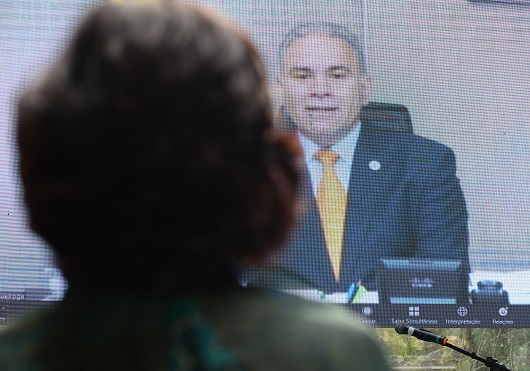
Minister Queiroga attended remotely the event and mentioned her “brilliant curriculum and solid academic history
The Ministry was followed by councilor Maurício da Costa Carvalho Bernardes, general coordinator for National Sovereignty and Citizenship Issues, representing the Ministry of Foreign Affairs, Carlos Alberto França. Bernardes said Nísia’s mandate is marked by participations in international forums and cooperations, and that the Legion of Honor awards her practice and contribution in these areas. “Fiocruz is the pride and joy of Brazilian diplomacy and one of the pillars of our international scientific partnerships. On behalf of the friendship between France and Brazil, the Ministry of Foreign Affairs offers its thanks to the institution”.
Participants then listened to the song “Lá e cá”, by Leci Brandão, performed by the Music School of Manguinhos. The lyrics, written in 1987, trace a parallel between the lives of South African black people, who back then were under apartheid, and black people in Brazil.
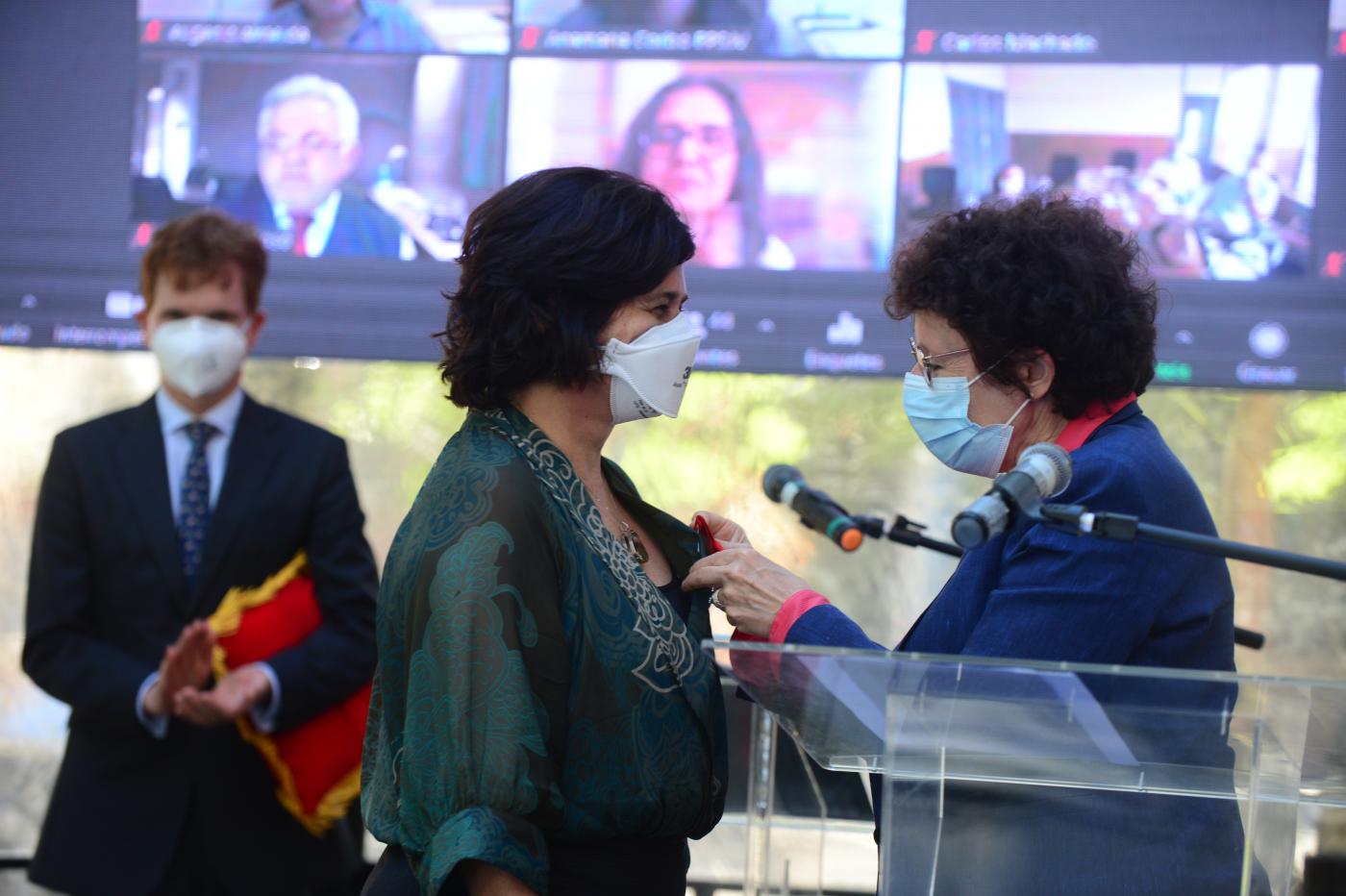
“President Nísia also stands out for her work with health diplomacy, participating in different WHO and PAHO groups. She is a great enthusiast of the facilitation of transmission and access to knowledge, and is a huge role model for young women, showing, in practical terms, that high-level positions in science are open to women”, highlighted Collet
Right after the performance, ambassador Collet talked about the relevance and significance of the honor granted to Lima. She started by talking about the return of Oswaldo Cruz to Brazil in 1899, after studying microbiology, sorotherapy and immunology at the Pasteur Institute, and legal medicine at the Institute of Toxicology, in Paris, for two years. In 1914, already internationally known for his successful fights against Brazilian epidemics, Oswaldo Cruz was graced by the French government with the title of Officer of the Order of the Legion of Honor. Some years later, in 1923, the then director of the Oswaldo Cruz Institute (which gave origin to the current Fiocruz), Carlos Chagas, was also granted the title of Officer of the National Order of the Legion of Honor of France.
Collet mentioned the professional trajectory of president Nísia and said she has managed to bring together, in her journey, areas such as History, Public Health, Geography, Sociology, and Biology, and has contributed immensely to the partnership between France and Brazil. “In the Year of Brazil in France, between 2004 and 2005, Nísia coordinated events, seminars and exhibits, and tightened even further the links between Fiocruz and Inserm (National Institute of Medical and Health Research, in the French acronym), the Pasteur Institute, and the National Center for Scientific Research (CNRS, in the French acronym)”.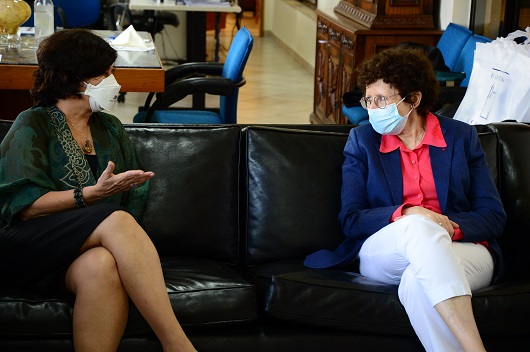
Ambassador Collet listed the main measures undertaken by Fiocruz in the fight against the pandemic
The ambassador reminded the audience that Nísia, together with French doctor in political studies Marie-Hélène Marchand, organized the book Louis Pasteur & Oswaldo Cruz. The book, launched in 2006, narrates the cooperation between the Pasteur Institute and Fiocruz throughout the 20th century, considered one of the most successful experiences in the history of scientific relations between Brazil and Europe. “President Nísia also stands out for her work with health diplomacy, participating in different WHO and PAHO groups. She is a great enthusiast of the facilitation of transmission and access to knowledge, and is a huge role model for young women, showing, in practical terms, that high-level positions in science are open to women”, highlighted Collet.
The ambassador listed the main measures undertaken by Fiocruz in the fight against the pandemic, such as producing COVID-19 vaccines, installing the COVID-19 Hospital Center, actions in health assistance and clinical research, and others. After her speech, the ambassador pinned the Legion of Honor insignia on to Lima’s blouse.
The Fiocruz president began her speech by mentioning the Casa de Oswaldo Cruz (COC/Fiocruz), the unit through which she first entered the Foundation, in 1987. She also mentioned her family, including her children, her grandchild and her father, among others, in addition to former presidents, directors, colleagues, assistants, and employees of Fiocruz with whom she has worked through these more than 30 years. The also mentioned the representatives of the institutions that were attending the event online, such as members of the Brazilian Academy of Science (ABC), the Brazilian Institute of History and Geography (IHGB), Pen Club, National Association of Post-Graduation and Research in Social Sciences (anpocs), the Brazilian Association of Collective Health (Abrasco), the Brazilian Center for Health Studies (Cebes), the National Academy of Medicine (ANM), the Brazilian Academy of Letters (ABL), the Pan-American Health Organization (PAHO), the Brazilian Society for the Progress of Science (SPBC), the National Council of Health Secretaries (Conass), and members of the communities that surround Fiocruz, such as Redes da Maré and CCAP Network.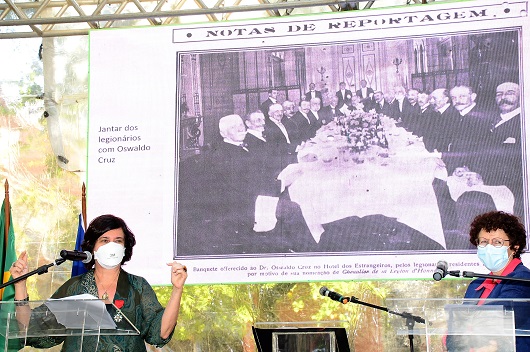
Nisia remembers that Oswald Cruz was granted by the French government with the degree of Officer of the Legion of Honor and honored with a banquet at the Hotel dos Estrangeiros, offered by legionaries residing in Brazil (in the image)
Nísia stated the honor proves that it is necessary to keep collective hope alive, to appreciate freedom and democracy. “These are the values I share with my colleagues and that are the foundation of this institution. This is how the Institute that gave origin to Fiocruz was created: it was marked right from its beginnings by the actuation of Oswaldo Cruz and a group of young researchers who faced the country’s problems back then. I entered the Foundation in 1987 and I can sincerely say this is my great school. Fiocruz debated big national issues, such as the Sanitary Reform, the 1988 Constitution, and the Unified Health System (SUS). The Foundation remains ready to give its contribution to the discussion of Brazilian problems”.
The president commented on the partnerships with French universities and research institutes, including the Pasteur Institute, Inserm, CNRS, the Sorbonne, the School of Advanced Studies in Public Health (EHESP, in the French Acronym), the Mérieux Institute, and the Servier Laboratory. All these institutions have a long history of collaboration with Fiocruz, in different areas.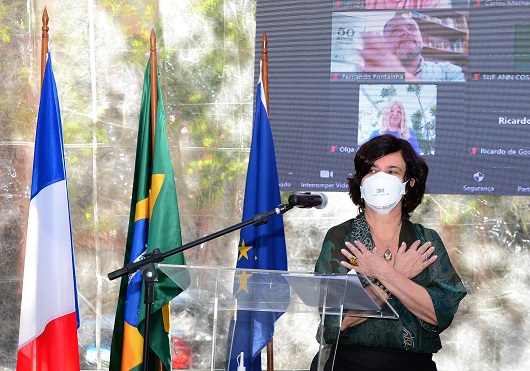
Nísia stated the honor proves that it is necessary to keep collective hope alive, to appreciate freedom and democracy
According to Nísia, the “unity in diversity” that characterizes Fiocruz and its institutes, has been crucial to mobilize all energies and fight the pandemic, “one of the greatest catastrophes experienced by humankind”. She said that in order to overcome this hurdle, “a total social fact” that involves all dimensions of life, according to the ideas of French sociologist and anthropologist Marcel Mauss, scientific knowledge is necessary, yes, as well as political actions undertaken by the State and by society. Nísia wrapped up her thank-you speech by emphasizing that Brazil needs science, health, citizenship and democracy to beat the pandemic.
“Let us keep moving on inspired by poet Cecília Meirelles: “But life, life, life is only possible when reinvented”.
Oswaldo Cruz’s Legion of Honor
In April 1914, physician Oswaldo Cruz went to Montevideo, Uruguay, as a Brazilian representative at the International Public Health Conference, also attended by Argentina and Paraguay. At that time, the Oswaldo Cruz Institute had already been acknowledged as one of the main research centers in Latin America dedicated to the study of tropical diseases. The success of the fight against yellow fever in Rio de Janeiro and the discovery of Chagas disease were widely mentioned at the Hygiene and Democracy Expos, in Berlin (1907) and Dresden (1911). At the end of the Public Health Conference, Oswaldo Cruz was invited to follow on to Buenos Aires, Argentina, where he would be granted an award by the Academy of Medicine and would receive the title of honorary professor of the School of Medicine of Buenos Aires.
During his trip, Cruz received the news he had been granted the degree of Officer of the Legion of Honor by the French government. The fact stirred great repercussion in the Rio de Janeiro press. Soon after his return, the scientist was celebrated with a banquet at the Hotel dos Estrangeiros, offered by legionnaires residing in Brazil. Cruz received the honor from French minister M. Lanel, who was visiting the country.
In 1923, Carlos Chagas, then director of IOC, was also given the title of Officer of the National Order of the Legion of Honor.




